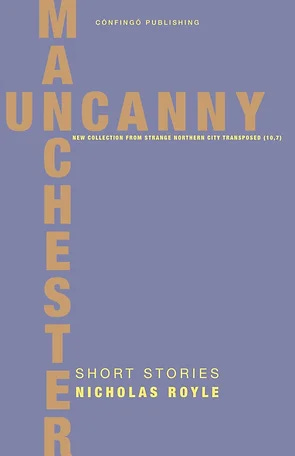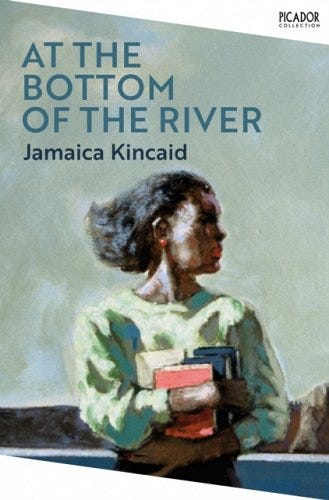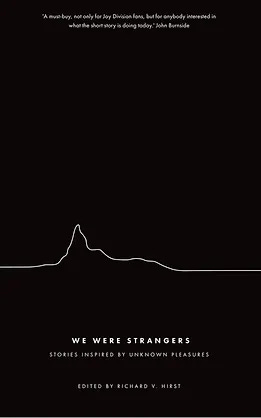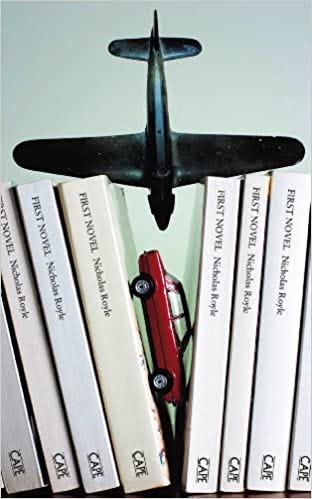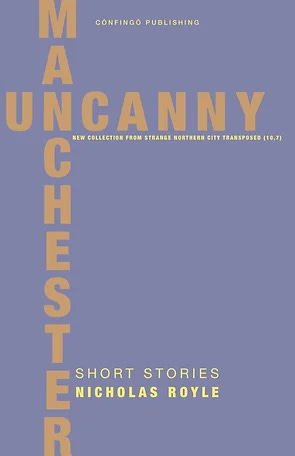24 Nov 22 | Issue 43
This being a column of consumerism and philosophy I should really be riffing on Black Friday, but we at Consume and Enjoy have a rule to never chase the new. Fashionably late and French leave are our friends.
I’ve been conducting a correspondence with Nicholas Royle, author and owner of Nightjar Press, which produces eerie tales as chapbooks — being a single story printed as a booklet. To celebrate the newly published second collection of his city based stories — Manchester Uncanny – this week veers away from buy less, buy better to buy Royle. This interview was conducted by Royle Mail. OK. No more Royle puns. Promise.
Normal philosophical consumerist fare will return next week.
Manchester Uncanny by Nicholas Royle | www.confingopublishing.uk/manchester-uncanny
Julian: A banal question, just to put flesh on the biography bones. I know you're an avid music fan, and as a purveyor of the eerie, surprisingly you're also keen on playing football. Were you born wanting to write or was a more circuitous route taken?
Nicholas: I was born or soon became an avid reader and the desire to write seemed to come out of that, around the age of 19, 20, when I was a student. I started writing short stories and sending them off to little magazines and they would all come back with little rejection slips. And then, one day, in 1984, came an offer of publication, in the 26th Pan Book of Horror Stories. I thought, this is it. I’ve made it.
Julian: As well as publishing chapbooks of "the eerie", you've written four books of short stories. Leaving aside the usual short story versus novel enquiry, do you think there is something in the shorter format that makes it particularly suited to the uncanny?
Nicholas: Increasingly I’m interested in not only uncanny stories but also experimental stories and in stories that attempt to be both, indeed, that attempt to achieve uncanny effects precisely by their experimental approach. I made some experiments myself in this direction that appeared in London Gothic and there will be one or two more in Manchester Uncanny. With a short story the amount of time both writer and reader have to put in is obviously shorter, so there’s less at stake, meaning you can take more risks, so you can experiment more.
The writer who blazed a trail is the late Giles Gordon. He wrote many traditional ghost stories (as well as more general, non-supernatural stories) and many experimental stories, and many boldly experimental stories, too. He also co-edited the anthology series I was looking to emulate when I set up Best British Short Stories, namely Best Short Stories, which he did for nine years with David Hughes.
Julian: You used Brion Gysin’s cut-up technique for “Disorder”, your contribution to “We Were Strangers” — a collection of short stories inspired by Joy Division’s “Unknown pleasures”. One of the most disturbing things I’ve read I might add. Its ambiguity conveys a very realistic portrayal of a deeply disturbed individual. Did you think about Burroughs considering the technique to be actual chaos magicking, rather than literary tool, when you were “divining” “Disorder”?
What are you looking for in experimental fiction? Is it the equivalent of ambient music compared to pop?
Nicholas: I’m no expert on Gysin’s cut-up technique, but from my limited reading I think he didn’t mind whether the resulting text made sense or not. Although it may be hard to believe, from a reading of ‘Disorder’, I would like my experiments to make sense. I always want a story to be implied, at least. Or for one possibly to be inferred by the reader, if there’s any difference in those two aims. Had I not been concerned about it making some kind of sense, it would have taken a lot less time to write. As it was, it took months, and I almost gave up several times, but in the end I was glad I kept going. The approach was suggested by the title of the track I picked – ‘Disorder’ – and I liked the challenge it represented. Taking all the lyrics and literally cutting them up, word by word, and reassembling them into something close to a story. I wanted to see if the resulting text would create the same kind of mood as the album.
I find writing under constraints strangely liberating. I write stories I would never otherwise have written. There are some in London Gothic I particularly enjoyed doing – both researching and writing – especially ’The Old Bakery’ and ‘Constraints’. The latter offered an opportunity to pay tribute to two experimental writers who lived in London – Giles Gordon and BS Johnson – by walking from Gordon’s former address in Kentish Town to Johnson’s old home in Islington and recording any text-based signs, notices, warnings or other forms of communication on the way, and using these, as scraps of found text, to create something approaching a narrative (propelled by the walk itself). In ’The Old Bakery’ I used my many years of experience as a sub-editor to satirise the kind of interiors feature one might come across in, say, the Observer Magazine.
I look to have my expectations subverted by experimental fiction. I want to read something fresh and new and darling and surprising, but also, crucially, I want story. I don’t mind if it’s hidden or buried. In fact, I like it to be. I also like to come across evidence of a sense of humour. Simon Okotie’s novels are very funny. I LOLed when I found Georges Perec’s own name in the index at the back of his novel Le vie mode d’emploi and found that the three page references were to the title page, the acknowledgements and the ‘by the same author’ page.
In a second-hand record shop, the section I’m invariably drawn to might be called something like experimental or avant garde and will often include ambient music, which may or may not belong there. I think there’s a big difference between, say, drone and New Age music; I’d sooner listen to (and write to) Stars of the Lid or Deathprod than George Winston’s cover of ‘Walking in the Air’, for example.
Julian: Psychogeography is one of those terms frequently dropped by hipsters, with its history linking it to Guy Debord and The Situationists. Oft used to label people writing on the environment, few I think fulfil Debord’s description — the study of the precise laws and specific effects of the geographical environment, consciously organised or not, on the emotions and behaviour of individuals. — as well as you do.
I know you tend to walk a lot, can you drive? — I can’t, a rarity these days.
Has walking influenced your writing, bringing psychogeography to the fore? A rhetorical question really, given you're about to publish Manchester Uncanny to accompany London Gothic. So a rephrase, is it something you consciously take an interest in, including other writers, or does its apparent influence arise from elsewhere, do you have a hidden architecture or city planning degree?
Nicholas: Walking just seems to me like the obvious and most appropriate and most rewarding way to explore and engage with a landscape, whether urban or rural. I do drive but prefer to walk. Walking speed is more natural and safer. I can think as I walk. I can read as I walk. I can even edit a manuscript as I walk. There’s something about the mechanical act of walking that frees up the mind and helps you – well, me – solve problems. Mainly those to do with writing, it’s true.
At the moment I’m restricted by an injury caused, most likely, by over-exercise. By walking too far and too fast. This is agony for me. Literally and figuratively. Shinsplints or, more accurately, my physiotherapist thinks, tendinopathy. For the past 18 months I’ve been walking ten miles a day, on average. I have always been keen on walking, but as I have got older it has become more of a compulsion. In part it is – or has been – a reaction to stress and anxiety, but it is also very practical. If I’m stuck on a story, it’s only by walking that I can make progress. Nothing else works.
I’m not especially interested in or knowledgeable about Guy Debord or the Situationists. I’m not a flâneur, because my walking is not directionless or random. I’m usually heading for a second-hand bookshop. I always have a destination. The same is true of my fiction. There’s a destination. I just don’t always know what it is. Walking helps me find it.
Julian: This segues rather smoothly into the question I’ve been wanting to ask you all this time. I have very little interest in how writers write, their procedure. Like those scenes in films where the band is seen composing the song. An exception being something you once said that has fascinated me ever since.
There is what I would call a classic denouement — twist — reveal at the end of First Novel.
I remember you saying that when you wrote it you didn’t know the ending, how the two separate character story-arcs would unify at the end. I’ve come to understand how writing can generate writing, or in your case, walking. But it seems a very bold move to start a novel in this way, given it’s an approach perhaps better suited to a short story?
How far — without spoilers of course, just a measure will do — did you have mapped out when you started it. How much plot had to be developed post kick-off?
I can’t help imagine it like the train chase in Wallace and Gromit, where Gromit is frantically laying the track down, hanging from the front of the train.
(PS I bet no-one has used a Wallace and Gromit metaphor to describe your tales of the uncanny before).
Nicholas: The Wallace and Gromit analogy is very accurate, actually. I sometimes have a vague idea of where I want to go, but no idea how to get there. Other times, I get so far and find the path disappears. That’s when I have to go out for a walk. There’s no point staring at the screen. I go for a walk and talk to myself and work it out. It’s never not worked. This was definitely the approach with First Novel. Then, of course, you go back and do a lot of retro-fitting so that it looks like you knew what you were doing all along.
Julian: I think us readers view authors as natural born storytellers. As if they all have stories readymade to tell. With your inside view as an editor and creative writing tutor, is this start-without-knowing-the-end a common approach?
Nicholas: It’s probably less common than the work-it-all-out-in-advance method, but I’m not alone. I know other writers who use the same approach as me. I wouldn’t recommend one way over the other, as you have to find your own way. Even if I were capable of working it all out in advance, I wouldn’t use that method, since part of the enjoyment for me is finding out where it’s going. If I knew where it was going to end up, and how, I’d have no interest in writing it.
Unlike H. R. Giger1, my mother once spent a night at his house — note: at, not with — who was apparently every bit the dark edgelord we expect, replete with every room painted black, Nicholas is in real life very funny. Not the eldritch character you might suppose.
His Instagram is a delight, where, amongst the quirky street photography are his irregular series ‘Nicholas as famous people’ and ‘recreate the album sleeve’. If you were wondering why this week's cover stars are Edith Sitwell and Sigmund Freud — illustrated by the amazing artist-in-residence Fatima Fletcher — this may help explain…
Nicholas Royle as, clockwise starting top left, Edith Sitwell, Sigmund Freud, Dame Caroline Blackwood, William S. Burroughs. Courtesy of his Insta www.instagram.com/nicholasroyle which I highly recommend you follow.
Speaking of recommendations, mine are this week, somewhat unsurprisingly, three titles by, yes, Nicholas Royle. But before I do, I asked if he could recommend his must-read novel and a movie to us…
My book recommendation is Jamaica Kincaid’s short story collection At the Bottom of the River, recently reissued by Picador. It’s one of the shortest and one of the best collections I’ve ever read.
At the Bottom of the River by Jamaica Kincaid | Buy here
My film recommendation is A Snake of June (2002, Shinya Tsukamoto), which I watched twice while writing stories for Manchester Uncanny. It’s very difficult, almost impossible, to say what it’s about or what happens in it. I love it for its blue monochrome, its constant rain, its towers that, in the rain, resemble Manchester’s Deansgate Square. There’s also a Mini in it – I like all films with Minis in – and it’s extremely weird.
A Snake of June directed by Shin'ya Tsukamoto
We Were Strangers | www.confingopublishing.uk/we-were-strangers | Review
An anthology of ten stories inspired by Joy Division's Unknown Pleasures. Featuring Nicholas Royle’s Disorder, as mentioned, one of the most disturbing things I’ve read. Are you singing it yet? Weeeee weeere straaaaa-aaan-gersss…
First Novel by Nicholas Royle. Not on uk.bookshop.org so it’s Amazon, to which I’m not linking.
The closest he gets to mainstream, more along the lines of early Ian McEwan (in a good way) than experimental or eerie horror. Amusingly not actually his first novel. Marvel at the ending. Gromit saves the day.
Manchester Uncanny by Nicholas Royle | www.confingopublishing.uk/manchester-uncanny
My copy is in the post. Actually Royle Mail. I know I promised no more puns but this time it’s true. The first time I ordered some Nightjar chapbooks they were put through my letterbox in an envelope with no stamp, announced by an email with only a photograph of my front door in it. Not creepy at all.
Recommended on the strength of the short stories I’ve read in London Gothic, and Ornithology, both also Confingo Press.
Nightjar Press nightjarpress.weebly.com
Eerie, experimental, adventurous tales. Beautifully produced and lovingly published. The sort of venture that makes my heart sing. People doing what they love very well. I hadn’t noticed until recently the care that goes into pairing the covers. Not obviously noticeable until you visit nightjarpress.weebly.com/news and spot the pairings.
This week featured
en.wikipedia.org/wiki/Nicholas_Royle
Buy me a coffee at www.buymeacoffee.com/vfnIE9P0Ta
Illustration by Fatima Fletcher
The amazing artist Fatima Fletcher is artist in residence.
Please show Fatima your love by following and liking every single one of her posts at www.instagram.com/fatima.fletcher, and visiting fatimafletcher.com, where her work is for sale, she is available for commissions.
Her wonderful Ruff Ruff coasters are for sale at fatima-fletcher.square.site/s/shop
Send to a friend
I’m currently interviewing a few more authors, and would love their work to reach a wider audience. If there’s someone you know who might enjoy these posts, please forward this email to them, or one you think better suited to wooing. Better still, ring them up, harangue, shout, threaten and coerce them into subscribing. Nicely, of course.
References
https://en.wikipedia.org/wiki/H._R._Giger
Legally I have to tell you I might get five pence or something from Bookshop dot org should you purchase something, but really I just want to stick it to Amazon and keep independent bookshops alive. Yeah, rebel me, bringing the man down from the inside etc etc.




